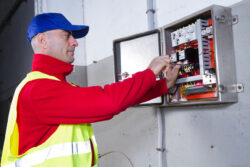- URL
Share
The IP rating system is one of the most common ways to rate an electrical enclosure’s protective qualities. This international rating scale uses a two-digit number to denote how well an electrical enclosure protects its contents. When specifying an outdoor enclosure for an electrical device, you’ll encounter ratings like IP66 and IP67, and it’s important to know what they mean.
IP ratings ultimately aren’t hard to understand once you understand their core concepts. However, the degrees of difference between ratings can be tricky to grasp, so we’re here to talk about two enclosure ratings, IP66 and IP67, that are close together but have some important differences. Below, we’ll tackle the question of IP66 vs. IP67 enclosures.

Source: franco lucato/Shutterstock.com
How to Understand IP Ratings
Here’s a quick primer on IP ratings to get us started. The IP system is a rating scale for the protective qualities of electrical enclosures, used mainly in Europe but in some applications in North America. (For information on NEMA ratings, the other common rating system used in North America, see our NEMA ratings guide.)
The rating scale is based on IEC 60529, a standard for electrical enclosures in the International Electrical Code. IP ratings are two-digit numbers that measure the level of protection an enclosure offers against hazards in the device’s environment. Each of the two numbers has a different meaning:
- First Number (0-6): Level of protection against solid ingress, such as flying dirt, dust or accidental contact with equipment and personnel.
- Second Number (0-8): Level of protection against water ingress from sources, such as precipitation, hose spray or submersion.
You’ll find IP ratings on all kinds of enclosures, but they’re especially important for enclosures that protect sensitive electrical and electronic equipment in harsh environments. Next, we’ll discuss two especially common IP ratings, IP66 and IP67, and compare them.
IP66 at a Glance
Let’s look at the IP66 rating first. IP66 enclosures are suitable for general outdoor applications and are designed to offer excellent protection against most harsh conditions.
Breaking the rating down, we see the first digit is a 6, which means it offers completely dust-tight protection against solid ingress. The second digit is also a 6, which means it protects against water ingress even from powerful sources like pressurized water jets, ocean waves and heavy rain.

Polycase WC-22F, an IP66 enclosure
IP67 at a Glance
An IP67 enclosure is designed to offer protection against anything up to and including submersion in water in depths up to a meter. That’s serious protection and, in fact, IP67 is the second most protective outdoor enclosure rating.
As with the IP66 rating, a 6 in the first digit slot means enclosures with this rating are completely dust-tight. However, the 7 in the second slot means IP67 enclosures also offer protection even when the enclosure is temporarily submerged. Specifically, an IP67 enclosure must protect against water ingress at depths of up to one meter and durations of up to 30 minutes.

Polycase HD-44F, an IP67 enclosure
Comparing IP66 vs. IP67
There’s one major and obvious difference between IP66 and IP67 enclosures: resistance to submersion. If your enclosure application requires submersion resistance, IP67 is the better IP waterproof rating for your needs.
Should your enclosure require even greater submersion resistance for prolonged periods, you might even consider upgrading to an IP68 enclosure rating. IP68 enclosures are rated to protect against greater submersion depths and longer submersion periods, and many IP67 enclosures also carry an IP68 rating.
However, an IP66 outdoor enclosure will still provide robust protection for most electrical devices, indoor or outdoor. If your application requires enclosures highly water resistant but doesn’t involve submersion, IP66 enclosures are an excellent choice.
IP66 and IP67 Enclosures from Polycase
What kind of IP66 and IP67 enclosure options does Polycase offer? Let’s check out some of our many options:
- IP66 Enclosures
- Polycase WP Series: Versatile, tough and cost-effective polycarbonate enclosures
- Polycase SB Series: Carbon steel enclosures for serious protection and performance
- IP67 Enclosures
- Polycase HD Series: Our top-selling IP67 polycarbonate enclosures
- Polycase AN Series: Ultra-tough enclosures made from elegant diecast aluminum
All IP ratings on our enclosures are independently tested and certified through UL, the gold standard organization for materials testing. And don’t forget—it’s also incredibly easy to customize most of our enclosures through our on-demand CNC machining and digital printing services.
Polycase is always happy to assist with rating questions, custom orders, selection advice or anything else you need. Our enclosure professionals are available by phone at 1-800-248-1233, or contact us online through live chat or email.
0 Comment
